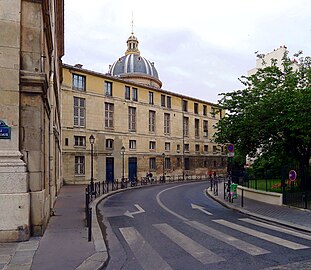 Rue de Seine at the level of the Rue Jacob | |
| Length | 665 m (2,182 ft) |
|---|---|
| Arrondissement | 6th |
| Quarter | Saint-Germain-des-Prés |
| Coordinates | 48°51′15″N2°20′13″E / 48.85417°N 2.33694°E |
| From | 3 quai Malaquais |
| To | 16 rue Saint-Sulpice |
| Construction | |
| Completion | 1259 |
The Rue de Seine is a street in the 6th arrondissement of Paris. It is one of the most sought after streets in Paris due to its history and very close proximity to the Louvre and other famous Parisian landmarks. [1]
Contents
The Rue de Seine and surrounding streets are host to the highest concentration of art galleries and antique dealers in the world. [1] Other nearby famous landmarks include the Café de Flore, Les Deux Magots and the Jardin du Luxembourg. The neighbourhood of the Rue de Seine also includes famous fashion houses, such as Dior, Yves Saint Laurent and Hugo Boss.



